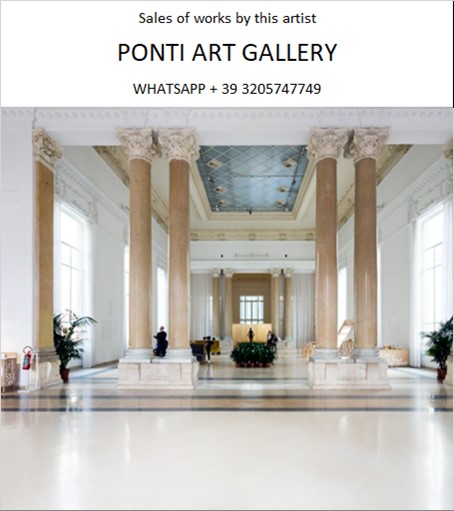Ponti Art Gallery is interested in buying and selling works
of art by this artist.

Anni Albers Biography
Anni Albers, born Annelise Elsa Frieda Fleischmann on June 12, 1899, in Berlin, Germany, was a visionary textile artist, printmaker, and designer whose work played a pivotal role in redefining the role of fabrics in art and design throughout the 20th century. Her innovative approach to weaving, her exploration of materials, and her theoretical writings have established her as a central figure in the modernist movement and a pioneer of textile art.
Albers's early life in Berlin was one of cultural affluence; her mother's family was involved in the publishing industry, and her father was a furniture maker. This environment fostered her artistic inclinations, leading her to study under the Impressionist artist Martin Brandenburg from 1916 to 1919. Despite her initial interest in painting, a discouraging encounter with artist Oskar Kokoschka prompted her to reconsider her artistic path.
In 1922, Albers joined the Bauhaus, the avant-garde school of art and design in Weimar, Germany, which emphasized the unity of art, craft, and technology. The Bauhaus was a breeding ground for experimentation and innovation, but it also reflected the gender biases of the time, relegating women to what were considered more 'feminine' disciplines. Albers was thus directed to the weaving workshop, a medium she initially approached with reluctance.
Despite this, Albers quickly embraced the potential of textiles, studying under the tutelage of artists such as Paul Klee. She began to experiment with new materials and techniques, incorporating non-traditional elements such as cellophane and metallic threads into her weavings. Her work at the Bauhaus was characterized by functional innovation, as she developed textiles that addressed sound absorption, durability, and the minimization of wrinkling and warping.
In 1925, Anni married Josef Albers, a fellow Bauhaus student and later a prominent figure in his own right as an artist and color theorist. The couple formed a lifelong partnership, influencing each other's work and careers. When the Bauhaus moved to Dessau in 1926, Anni Albers became a central figure in the weaving workshop, eventually taking on the role of acting director.
The rise of the Nazi regime and the subsequent closure of the Bauhaus in 1933 forced the Alberses to flee Germany. They emigrated to the United States, where they were invited to join the faculty of Black Mountain College in North Carolina. At Black Mountain, Anni Albers continued to innovate in the field of textiles, while also beginning to explore printmaking. Her teaching and work at the college further solidified her reputation as a leading figure in textile art.
Albers's travels, particularly to South America, had a profound impact on her work. She was deeply inspired by pre-Columbian art and textiles, which influenced her understanding of woven thread as a form of language and her appreciation for the tactile qualities of materials. This inspiration is evident in her wall hangings, which often incorporate geometric patterns and vibrant colors reminiscent of ancient Andean textiles.
In 1949, Albers became the first textile artist to have a solo exhibition at the Museum of Modern Art in New York, a landmark event that helped establish weaving as a modern art form. Her seminal book "On Weaving," published in 1965, further cemented her status as an influential thinker and practitioner in the field of design and textile arts.
Throughout her career, Albers received numerous accolades and her work was exhibited widely. She continued to create and innovate until her death on May 9, 1994, in Orange, Connecticut. Today, Anni Albers's legacy lives on through her art, her writings, and the countless artists and designers she has inspired. Her contributions to modernism and her redefinition of textiles as a powerful medium for artistic expression have secured her place as one of the most important artists of the 20th century.
Anni Albers Quotes and Sales
of Works
Ponti Art Gallery selects and deals with paintings by the
artist. Upon request, we provide free estimates and
evaluations, communicate prices, quotations, and current
market values.
If you are interested in BUYING or SELLING works by the
artist, contact us immediately.
If you wish to sell or receive an evaluation of the
works:
Send us a frontal photo of the painting, one of the back,
and one of the signature. Also, indicate the dimensions of
the work. Inform us about the purchase origin of the work
and any kind of available documentation (purchase
receipts, certificates of authenticity, publications). One
of our operators will respond to you on the same day. We
guarantee maximum confidentiality and extreme
professionalism.
If you wish to purchase works by the painter: Contact us
and let us know your request. We will inform you about the
available works. We also offer the possibility to
subscribe to our NEWSLETTER, through which you will be
informed at the beginning of each month about the latest
acquisitions of the art gallery.
You can send us pictures of the work:
